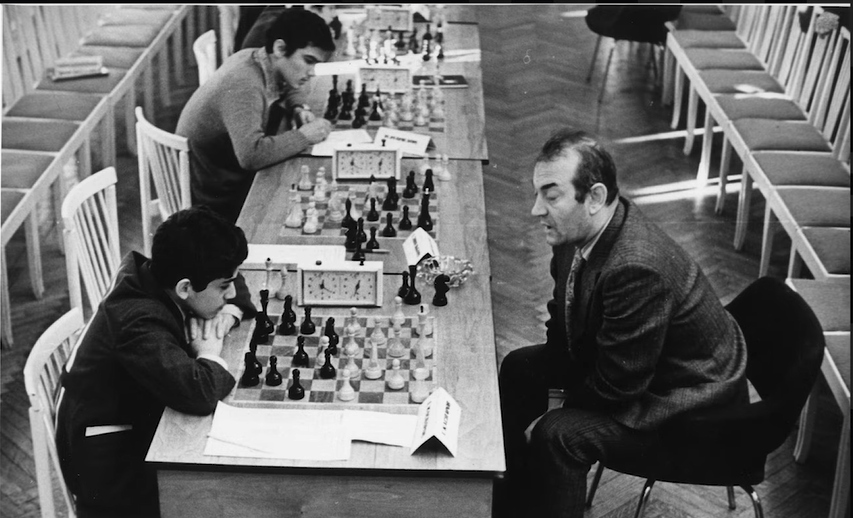Within a couple of years, once the 15-year-old Kasparov would reach the finals of the U.S.S.R. Championship, Mikhail Tal would quip about the Bakuvian: "Garry already plays so well that he could easily play under his former family-name..."
When Garik Weinstein was only 11, chess prospects outside of his native Azerbaijan, in which he was certainly considered a star, were not yet clear. And then – as suggested by his coach, Alexander Nikitin, who was joined by his mother's family – he became Kasparov. Very timely!
Three brilliant successes followed each other, which forced people to remember the name "Kasparov". He won the Baku Cup amongst adults, where in the finals he beat Oleg Pavlenko. The U.S.S.R. Championship among juniors, in which he failed to get on the podium only because of sheer impatience.
And most importantly - the game at the all-Union tournament "Pioneers against grandmasters", in which Kasparov met Karpov for the first time! In that game, regardless of the great position he obtained, in their one on one encounter the 11-year-old Candidate Master couldn't hold but unknowingly instilled fear in the entourage of the almighty Anatoly Evgenievich. "I had a feeling then: This doesn't happen for no reason!"
And the game with Korchnoi, in which Viktor Lvovich only miraculously managed to resist, and because of which he missed the first spot among the grandmasters, clearly made it clear to everyone: a new star appeared in Soviet chess!






It would seem that the life story of the 13th World Champion, the greatest chess player of our time Garry Kasparov has already been looked into thoroughly- both by himself and dozens of biographers, and that there are neither blank spots nor places for interpretation in it.
Ilya Levitov, who conducted a 24-hour dialogue with "The Great and Terrible", is inclined to argue that this is far from the case! Kasparov is unique in the chess world, not only for his contribution to theory and his practice of the game, which had no equivalent either before or after him, but also for his tireless thirst for victory.
For more than a quarter of a century of his unique career, Garry gave his all, winning almost every competition he took part in. He played in eight World Championship matches, he won six of them – and could have played more, if not for the war against FIDE, which he lead his whole life, and in which he was, alas, eventually defeated.
He holds all the records and achievements that ever existed in chess. Kasparov came ahead of Fischer by becoming the first player ever to cross the 2800-elo rating border. He held the first spot of the world rankings for 22 years. He scored the most victories, including a row in super tournaments, causing awe, if not horror, among colleagues.
He was the first to use computers in preparation, opening this "Pandora's box", and losing to it in a 1997 match. He opened a new era in the history of chess, where machines became stronger than humans ... Finally, Kasparov tried many times to transform chess itself, by turning it into a professional sport with proper prizes and a clear structure in which players themselves played the main role – and would not depend on the will of all-powerful officials!
Yes, his whole life and career is filled with contradictions. There is probably nothing else to expect from a chess genius. During the next 24 hours on air on the Levitov Chess channel you will learn everything about the life of Garry Kimovich Kasparov!
Or almost everything... You don't want to miss that. Today's first episode is dedicated to his childhood, his parents and his first steps in chess...